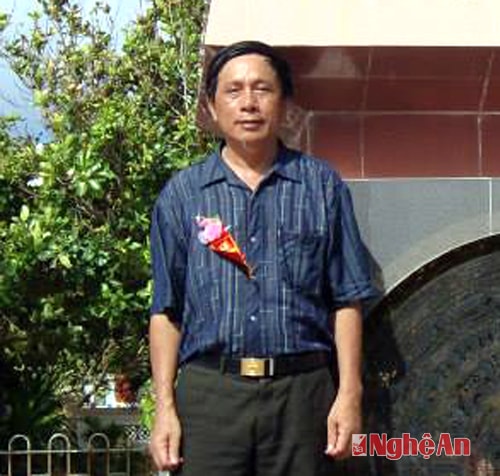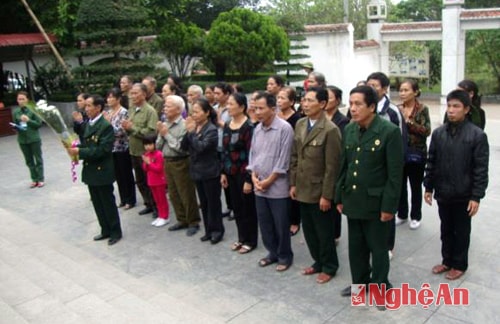Pham Ba Thai Tam: The torment of "a person who breaks an appointment"
(Baonghean) - Among the hundreds of poems by Pham Ba Thai Tam, I don't know why I'm haunted by that verse: "I live like a person who breaks an appointment". It is in a very simple poem of his, simple from the title: "December 1973 in Tra Vinh", so simple that it resembles diary entries more than poems. However, perhaps, the haunting thing it brings is the lingering feeling of being called by name, of being confessed by the wounded poet, who was lucky enough to return after many fierce battles, carrying the feeling of indebtedness to his fallen comrades...
 |
Pham Ba Thai Tam met me at a sidewalk cafe with a pensive look. Looking at his strong and sturdy figure, his ability to work so well that even after retirement he still accepted invitations to work part-time, no one would think that he had left 41% of his health on the battlefield, losing a left kidney due to a bullet fragment. I asked him what gave him so much strength, he smiled: "Thanks to literature". Thanks to literature, but he did not choose a career in writing. He considered it a unique and extremely sacred passion. That's it, he said, and he has never had a "manifesto" about literature like many other writers. If asked to choose a favorite line from his poems, he shook his head, probably impossible...
Pham Ba Thai Tam (born in 1953) real name is Pham Ba Tam. His high school teacher gave him the pen name Thai Tam, meaning his heart is like Thai Mountain (Thai Son), because when he was in school, he often wrote prose and poetry and had articles published in Thieu Nien newspaper. He has used that pen name until now and not many people in the province's literary community know his real name, they just call him by that pen name.
At the age of 17, while in the 9th grade (10-year system), the excellent student from Noi village, Tru Son, Do Luong volunteered to join the army. “At that time, our generation passed around poems that were filled with enthusiasm, urging young people to go to war. Literature had a tremendous power to move. I was the youngest child in a family of 8, and it was not my turn to be called up to join the army, but the poems led me there. They were poems by Che Lan Vien, Bui Minh Quoc, Luu Trung Duong…” The poems forced the young man to think about the ideal and the desire to contribute to the fight against the invaders. He was present in the army going to battle, when his heart sang “Song of the Ship”, “Go to the West”, “Poem about Happiness”…? Thai Tam was assigned to the C101 Reconnaissance Company, Regiment 3, Military Region 9, fighting in Tra Vinh, Vinh Long. During the march, during the stops, he kept a diary.
Thai Tam's compositions gradually increased on such journeys, when the young soldier opened his heart to the strange winds of life. Thai Tam remembers that during the march to the battlefield that year, his unit stopped at Ky Lon slope (Do Luong). It was about 4 pm on a foggy late winter day. The company commander pointed to a high mound of earth covered with green grass: "This is the mass grave of 13 Truong Bon Youth Volunteers. Comrades, please stand at attention and observe a minute of silence." The whole company stood solemnly in the frosty afternoon. At that moment, the young soldier's tearful lines of poetry appeared: "...Deep in the green grass grave/ Is where you, my brothers, are lying/ Bomb craters become buffalo wallows/ Sacred souls in the faraway sky/ A thin cloud falls/ Enough to make you sob with the words of a distant person/ It seems like just yesterday/ You, my brothers, were still out on the street..." (A moment of stopping at Ky Lon slope).
 |
| Pham Ba Thai Tam and his comrades visited the Youth Volunteers who died at Dong Loc T-junction. |
The diary pages grew thicker. In it, there was not only nostalgia for Noi village, nostalgia for the early mornings when he and his brother went down to Nghi Van to buy clay to make pots, nostalgia for the afternoons when he went into the mountains to get leaves to make pots, nostalgia for the poverty, hunger and the hard-working thatched roofs, but also so many dreams, so much sadness, so many thoughts about the soldier's life, about war, about the dream of peace; so many battles, so many faces, canals, streams crossed... Thai Tam wrote poems, wrote stories on the fronts where the guns had just stopped. There were many times when he "wrote in his head", mumbling even when he went to attack the fort. Each line of poetry, each story written, almost marked a memory of the battlefield. Memories that, when mentioned now, his heart still ached...
Around 1977-1978, Tien Phong newspaper published a short story by author Thai Tam called “Anh Ba Du”. The touching story is about the sacrifice of a soldier through the eyes and feelings of his comrade. Thai Tam said that he wrote the short story in 1974, right after the battle on November 23rd, when Ba Du - the comrade he had just met and asked for the name of the martyr. “He was a guerrilla, then a local soldier of Vinh Long province, who was captured and exiled to Phu Quoc by the enemy. In 1973, after the prisoner exchange, Ba Du was sent to the North for a period of recuperation and study. In 1974, he was assigned to return to the battlefield in the South. Around noon on November 22, he was introduced to fight in my squad. Just in time to introduce himself, at 2 pm the squad set off for battle. On the way, we only had time to chat, but the next morning, in the battle, he died. We were together for less than 24 hours” - Thai Tam said, then suddenly fell silent…
And not only “Anh Ba Du”, there were many other comrades whose names were mentioned in the diary of the young soldier Thai Tam. The soldiers who remained forever, as simple as the earth, as trees. The poem “December 1973 in Tra Vinh” told about such a person. It made the reader stop, because of the choking: “…After this battle/ Maybe one of us was absent/ Hearing Truong speak/ The whole squad was silent…”. Truong was the squad leader’s name. He had just announced the battle tonight. During the 30 minutes waiting to leave, a chess board was set up: “The referee Dao/ Truong held the white pieces/ Luong held the black pieces/ The whole squad became a Tet chess club/ 30 minutes were up/ Still no winner or loser/ The two “enemies” were in the same formation/ Both “sides” headed towards the enemy base…”. Then, the signal gun went off, the whole squad rushed forward. Drowning in the fog of bullets and fire. The voice of the squad leader, Truong, still resounded loudly: “The last firing point remains/ Must destroy! Charge!”. And when the enemy bunker collapsed, the whole squad realized: their squad leader staggered and collapsed. Passing the strategic hamlet, Truong returned on the back of his comrades. His comrades chose a piece of land under the shade of coconut trees for him to lie down. Opening their backpacks, their comrades looked for his hometown address to make an appointment to return… For more than 30 years, the promise has been deeply in the heart of soldier Pham Ba Tam…
That is also the memory of the attack on the fort in December 1974, just 1 month after Ba Du's sacrifice. His squad received orders to attack the fort of Cong Da, Tra On. He and his teammates sat in a ditch and fired water at the enemy bunker. A grenade exploded right in the ditch, he and 3 other teammates were injured and had to retreat. When he ran out and met the frontline medics, he fainted. When he woke up, it was already the 15th of January. After nearly a month in a coma, when he woke up, he found himself in the Regimental Hospital on an island in Soc Trang. One of his left kidneys had to be removed, and there was still a bullet fragment stuck in his body near his spine, the wound always tormenting him when the weather changed. "So there were sleepless nights again. Unable to sleep, he woke up to write poetry..."
Thai Tam said so, with a smile. “It is true that I relied on poetry to stand up and believe. Through all the hardships, all the hunger, all the confusion, all the failures, fortunately poetry was a warm and reliable support.”
He then added that after leaving the battlefield, he continued his studies and passed the entrance exam to the National Economics University. He got married in 1978, and it was not until 5 years later that he had his first child. Two more children were born one after another. He worked at Nghia Dan Construction Company 7 for nearly 20 years, then worked at the Department of Construction until his retirement in 2013. Never did the soldier and construction officer forget poetry. He said he had 40 years of writing poetry, more than 30 years of being a member of the Provincial Literature and Arts Association, but perhaps he was the only member who had not published a collection of poems. He planned to print a collection in the coming years with more than 300 poems... "to keep as a souvenir". He also hoped that: "Filtering sadness to find joy/ Combining pain to find a loving smile" as in his poem "July's Feelings". And perhaps, in it, he also expressed many of his life's torments - the torment of "a man in debt" to those who fell yesterday...
Thuy Vinh






